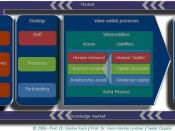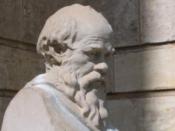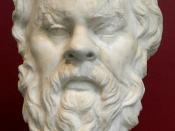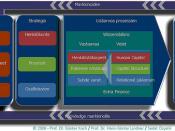The theory of recollection, according to Socrates, means that before we are born we possess all knowledge. We are never taught anything new, but instead reminded of things we already know. Socrates deduces this from the argument that the soul is immortal, "as the soul is immortal, has been born often and has seen all things here and in the underworld, there is nothing which it has not learned; so it is in no way surprising that it can recollect things it knew before...". This makes sense if we have a look at Meno's Paradox, which tells us that "a man cannot search for what he knows - since he knows it, there is no need to search - nor for what he does not know, for he does not know what to look for". This means that we cannot go from a state of not knowing (0) to a state of knowing (+1).
Then how do we know things? The answer is that we recollect knowledge.
But if we do possess knowledge, whether we attain it before or after we are born, that fact remains that knowledge still exists and we had to learn it at one point. But as Socrates states in the theory of recollection, our souls already knew all knowledge. There had to be some point in time when our souls did not know anything and were given the chance to learn. This negates both Meno's Paradox (because the soul had to go from not knowing to knowing) and the Recollection theory at the same time, for if the soul cannot learn anything, it cannot recollect what it does not know. In another example of why the recollection theory does not work, Socrates asks a slave boy, who had no prior schooling, certain questions about geometry: "Tell me now, boy, you know that a square figure is like this?" Here we can tell that Socrates is indeed controlling the boy's answers by asking him a leading question. He does not ask what is this figure, but instead gives the answer within the question. The boy is answering according to how Socrates is asking the question. Here, we can see that Socrates experiment with the slave boy does not prove this theory.






Recollection theory metaphorical not metaphysical?
The argument against the theory of recollection stated above is a good one, if a man doesn't learn new things but merely remembers knowledge from a previous life where did he get the knowledge in te previous life or the previous life before that?
Perhaps what Plato/Socrates is arguing is not that 'propositional' knowledge like geometrical theories is being learnt but rather Plato is showing that it is the ability to learn geometrical ideas (the capacity for knowledge) that is innate. The ability to do mathematics is something most of us are born with and in one way isn't taught. Although this ability isn't remembered in any sense of the term 'remember' that we use today.
0 out of 1 people found this comment useful.